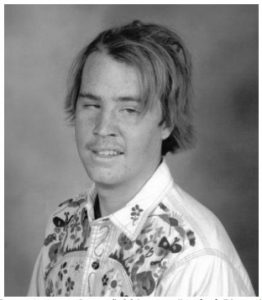
Eve Armstrong had an important question: How would things have turned out if she had summoned the nerve to ask a certain Barry Cottonfield to her high school’s junior prom in 1997?
Cottonfield, for those readers unfamiliar, “was a brash, unprincipled individual (private communications 1983-1998; Lunch Ladies’ Assoc. v. Cottonfield 1995) with slightly below-average learning capabilities (Consolidated Report Cards: 1986-1998), and with a reputation among the local police force for an alleged – yet unprovable – association with the serial disappearance of various neighbors’ cats.”
And Armstrong, a postdoc at the BioCircuits Institute at the University of California, San Diego, knew exactly how to answer her question: Use a neural network to, among other things, “examine the nonsensical decision-making strategies that emerge in Barry at times when he has recently engaged in a fight with his annoying kid sister Janice.” So she did, and posted a preprint on arXiv this week describing her results, titled, appropriately, “A Neural Networks Approach to Predicting How Things Might Have Turned Out Had I Mustered the Nerve to Ask Barry Cottonfield to the Junior Prom Back in 1997.”
Armstrong was gracious enough to answer a few questions about this groundbreaking work on the day listed on its cover page, April 1, 2017.
Retraction Watch (RW): Did you seek institutional review board (IRB) approval for this study? It does, after all, involve human subjects that could come to harm if they read it.
Eve Armstrong (EA): I did. They waived the requirement, citing two reasons. First, the likelihood was negligible that the proposed experimental design would put Barry under physical or emotional duress. Second, given that Barry was designed as feed-forward only, he wouldn’t remember any duress anyway. On a related note, the division of the IRB concerned with animal subjects communicated my description of Barry to the ASPCA, who queried me regarding those four missing cats. They won’t get off my back about it. As if I knew anything.

RW: Speaking of those human subjects, do you know what Janice was using in her hair in 1997? Are you sure that was actually from 1997, and not 1987? We couldn’t find any reference to hair products in the Materials and Methods section.
EA: Good question. According to Barry, and to a number of girls who participated in slumber parties with Janice throughout grade school, Janice was uncannily au naturale. She just woke up that way. And so long as she didn’t brush or wash it, it just stayed. (Her mom liked to blame the industrial polymers she claimed were present in the microwaveable plastic bowls she used while she was pregnant and too tired to cook with the stove.) I do agree with you that the effect is more 1980’s-esque.
RW: You use “we” to describe what you did in the paper, but there is only one author. Who is “we?” Perhaps Polly Matzinger’s dog?
EA: Yes, exactly, “we” includes Polly Matzinger’s dog (and/or anybody’s else’s dog, for that matter).
RW: Where do you plan to submit this paper?
EA: Let me tell you, I am having a devil of a time with this. I approached Cell, Neuron, and the Journal of Neurophysiology, all of whom declined without really citing a reason. Now that you have drawn my attention to your website, however, I am aware of the Journal of Universal Rejection and the Journal of Alternative Facts. I might hit them up.
RW: Are you concerned that Barry’s real date to the prom will be one of your peer reviewers?
EA: No, Barry wound up taking a piñata to the prom. He showed up halfway through it, with the piñata dressed up to look like a princess, and a lacrosse stick. He beat the piñata ‘til the candy came out, stood there eating it, and left. It was kind of strange. (But see below for a comment about the reviewers.)
RW: How will this paper appear on your CV?
EA: Exactly as is: Armstrong, E. A Neural Networks Approach to Predicting How Things Might
Have Turned Out Had I Mustered the Nerve to Ask Barry Cottonfield to the Junior Prom Back in 1997, 2017 April 1, https://arxiv.org/pdf/1703.
RW: Speaking of your CV, we note that your April 1, 2016 preprint, “Pipe-cleaner Model of Neuronal Network Dynamics,” has yet to be published. Why do you think you have had such trouble getting through peer review?
EA: I’m pinning it on bad luck with conservative reviewers. You see, either of these papers could be seen as making a rather controversial claim (that Barry Cottonfield is fascinating, and that magic trumps physics, respectively.) Some people find these notions unsettling. It’s too bad. It’s important to keep an open mind in this business.
Like Retraction Watch? Consider making a tax-deductible contribution to support our growth. You can also follow us on Twitter, like us on Facebook, add us to your RSS reader, sign up on our homepage for an email every time there’s a new post, or subscribe to our daily digest. Click here to review our Comments Policy. For a sneak peek at what we’re working on, click here.
OK I am gullible. Got to the hairdo question.
“Are you sure that was actually from 1997, and not 1987?”
Should rather be 1977 or 1967. If I remember correctly, Ziegler & Natta were awarded the Nobel in the 60’s.
Ah, thank you Google: “The Nobel Prize in Chemistry 1963 was awarded jointly to Karl Ziegler and Giulio Natta “for their discoveries in the field of the chemistry and technology of high polymers”.
1st April 2017.
Wow. Thanks.
I believe this is not Barry Cottonfield but indeed Ryan Reynolds!
I’m a 1950s kid lost in this discourse. At 81 years old, I guess I’m sort of out of touch. But my serious question is, “How do you justify that your perspective rather than mine is relevant?” I’m all ears.
I have a particular interest in how the variable “mullets” might influence such things. cheers and well done.